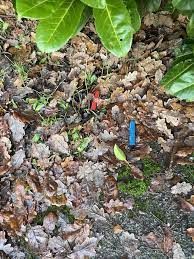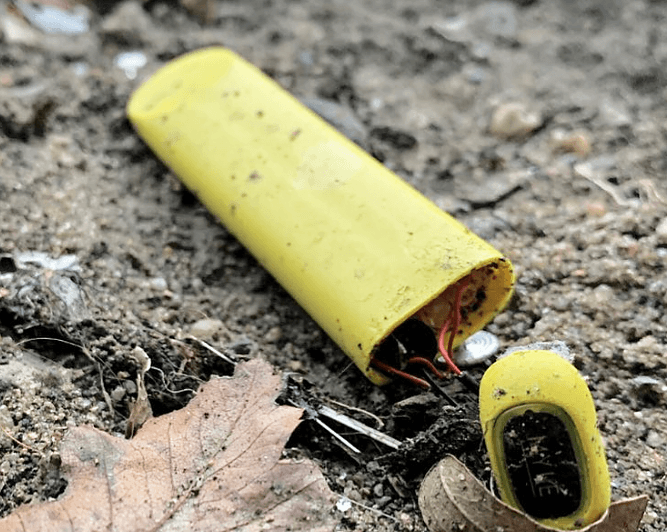The Environmental Crisis: The Impact of Discarded Vapes on Our Streets and Green Spaces

Over the last few weeks, NuGen has been actively involved in a series of litter picking efforts across various communities, working hard to improve the cleanliness and beauty of our streets and green spaces. However, what has truly shocked and disgusted our team is the alarming amount of vapes we’ve found discarded in bushes, on pavements, and in public areas.
These small, insignificant items have become a widespread problem, and after seeing the sheer volume of them, we felt compelled to investigate their environmental impact more deeply. What we’ve discovered is a troubling reality that needs urgent attention, and we believe it’s time to raise awareness about the unseen damage they are causing to our environment. Read on to find out more.
In recent years, the use of e-cigarettes, or vapes, has become a significant part of the cultural and consumer landscape in the UK. With an estimated 3.5 million adult vapers in Britain alone, the market for vapes and e cigarettes has exploded. While they are often marketed as a less harmful alternative to traditional smoking, there are growing concerns about their environmental impact, particularly in relation to the challenges of recycling these devices. The improper disposal of vapes, their components, and the inability to effectively recycle them pose serious environmental risks in UK.
The Growing Problem of E-Waste and the Environmental Impact of Vapes
One of the key environmental concerns around vaping devices is that they contribute significantly to electronic waste, or e-waste. E-waste is already a huge global issue, with millions of tonnes of electronics discarded each year. Vapes, being partially electronic, contain several components such as lithium-ion batteries, plastic, metal, and chemicals, all of which can be harmful if not disposed of properly.
In Scotland and the rest of the UK, there is a lack of proper infrastructure to handle the recycling of vapes, which has led to many being discarded in general waste. This results in pollution, as some of the substances within vapes can leach into the environment, harming ecosystems, wildlife, and even human health. Additionally, many vapes contain nicotine, a highly toxic substance that poses further risks if released into the soil or water systems.
The Challenge of Recycling Vapes in Scotland
Lack of Clear Recycling Systems
Scotland has made great strides in recent years with its recycling initiatives. With a target of recycling 70% of all waste in 2025, Scotland has been leading the way in terms of sustainability and waste management. However, the recycling of vapes is not clearly integrated into these systems. While it is widely known that electronic waste such as smartphones and computers should be disposed of at dedicated e-waste collection points, vapes and e-cigarettes are often overlooked.
Vapes are typically small and can be easily mistaken for general waste, leading to improper disposal. The current lack of clear, accessible collection points specifically for vapes means that many end up in landfills or incinerators, where they can release harmful chemicals into the environment. Without clear instructions for consumers on where and how to dispose of vapes correctly, a significant portion of the population remains unaware of the issue.
Complexity of Vape Devices
Vaping devices come in various shapes, sizes, and configurations, each containing a variety of components, including disposable pods, rechargeable batteries, plastic casings, and other electronic components. The complexity of these devices makes them difficult to recycle. While some parts, like the lithium-ion batteries, are recyclable, the rest of the device (including the liquid containers and plastic casings) often ends up being contaminated and is discarded in landfills.
Lithium-ion batteries, for example, can be hazardous if not disposed of properly. If not recycled, they pose significant fire and environmental risks. However, when vapes are disposed of as general waste, these batteries are not always retrieved or processed in the correct way. Instead, they may end up in landfills or incinerators, releasing toxins into the environment.
Consumer Behaviour and Lack of Awareness
There is also the issue of consumer behavior and awareness. Many vapers are simply unaware of the potential environmental impact of their actions. Disposable vapes, which are popular among young people, are often discarded after a short period of use. These products are not designed with recyclability in mind, and consumers may not even consider the environmental consequences when disposing of them. The fact that disposable vapes are often small and designed to be "throwaway" only exacerbates this issue.
Despite campaigns on reducing waste and improving recycling practices, there is still a general lack of understanding about the proper disposal methods for vapes. Many users are not familiar with local recycling programs and, as a result, vapes often find their way into general waste bins, contributing to pollution.
Difficulty in Disassembling Vape Devices
Many vapes are made with integrated designs that make it difficult to separate recyclable components. For example, many disposable vapes are sealed units, meaning that consumers cannot open them up to separate the battery or any other recyclable parts. This makes it almost impossible to recycle the individual materials effectively.
Even when the public recycling did accept vapes, the time and labor involved in breaking down these devices could make the process inefficient and costly. As a result, many recycling centers do not prioritise the collection of vapes, simply because they are not financially viable to process.
What Needs to Change?
1.Improved Collection Points and Recycling Infrastructure - One of the most pressing issues is the need for more accessible collection points for vapes. Just as there are designated areas for recycling batteries and electronics, there should be designated bins for the collection of vapes. Local councils, retailers, and e-cigarette manufacturers could collaborate to place more collection bins in key areas such as shopping centres, vape shops, and other public places.
2. Education and Awareness Campaigns - Raising awareness about the environmental impact of vaping is crucial. Public education campaigns could inform consumers about the dangers of improper disposal and provide clear guidelines on how to recycle their devices. Schools, health organisations, and local councils should take the lead in spreading this message more.
3. Product Design for Sustainability - Manufacturers of vapes could also do their part by designing products that are easier to recycle. For instance, they could focus on using materials that are more recyclable and design vapes that can be easily disassembled. Recyclable or biodegradable options would help reduce the environmental footprint of these products.
4. Government Regulations and Incentives - Government intervention is necessary to create a regulatory framework that addresses the recycling of vaping products. This could involve stricter regulations on manufacturers, such as requiring them to take responsibility for the waste their products generate. The introduction of a deposit return scheme for vapes, similar to what was used for bottles and cans, could provide an incentive for consumers to return their devices for proper disposal.
Conclusion
As vaping continues to grow in popularity across Scotland and the UK, the need to address the environmental challenges posed by vaping waste has become more urgent. Without the proper recycling systems in place, vapes will continue to contribute to electronic waste, harming the environment and public health. A concerted effort is required from manufacturers, local councils, consumers, and governments to ensure that vapes are disposed of and recycled properly. With the right infrastructure, education, and product design, the impact of vaping waste can be significantly reduced, making the future of vaping more sustainable for both individuals and the planet.
Get In Touch
admin@nugenwaste.co.uk






